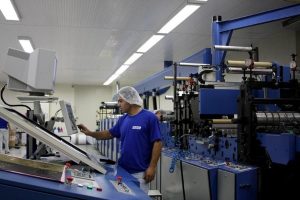
Revenue from exports of industrialized products from Mato Grosso do Sul in January 2019 reached US$ 315,67 million against US$ 266,06 million in the same month of last year, representing a growth of 19% in relation to the analyzed period. , according to Fiems Industrial Radar survey.
According to the coordinator of the Economics, Studies and Research Unit at Fiems, Ezequiel Resende, this was the best result for the month of January in the historical series of industrial exports in the state. “As for the relative share exported by the State, the industry accounted for 92% of all revenue obtained from foreign sales by Mato Grosso do Sul”, he informed.
The main highlights were the groups “Pulp and Paper”, “Refrigerator Complex”, “Mineral Extractive”, “Steel and Basic Metallurgy” and “Leathers and Skins”. “The products produced by these groups, together, represented 97% of the total revenue from the South Mato Grosso do Sul industrial products sales abroad”, completed Ezequiel Resende.
Breakdown by groups
The “Cellulose and Paper” group recorded revenues of US$ 185,46 million, an increase of 41%, which were obtained only from the sale of pulp (US$ 182,43 million), with China as the main buyers, with US$ 82,89 million, the Netherlands with US$ 25,33 million, Italy with US$ 18,95 million, the United States with US$ 18,85 million and Spain with US$ 10,05 million.
“The export of forest products reached an unusual highlight last year, leaving the traditional 4th position and approaching the 2nd position, occupied by meats. In 2018, exports from this sector (Paper, Pulp and Wood) totaled US$ 14,2 billion, 23% more than in 2017. The difference for meat exports was small and the volume and price of pulp determined the advance of the forest products”, analyzed Ezequiel Resende.
In the “Refrigerator Complex” group, revenue achieved in January was US$ 68,95 million, a reduction of 17% compared to the same period last year, with 40% of the total achieved coming from boneless frozen beef. , which totaled US$ 27,57 million, with the main buyers being Hong Kong, with US$ 11,63 million, Chile, with US$ 9,51 million, the United Arab Emirates, with US$ 7,70 million, China, with US$ 4,45 million, and Saudi Arabia, with US$ 3,83 million.
“Saudi Arabia suspended imports of chicken meat from five Brazilian slaughterhouses and the measure affected BRF, which is the largest exporter of halal chicken meat in the world. Since Carne Fraca, Saudi Arabia has also stopped enabling meatpacking plants in Brazil through the pre-listing system, through which establishments are authorized to export by sampling, without having to inspect all factories interested in exporting”, highlighted the economist.
Other groups
For the “Vegetable Oils” group, revenue reached US$ 20,97 million in January, an increase of 171% compared to the same period in 2018, with an emphasis on flours and pellets, which totaled US$ 20,91 million, with the main buyers being the United Kingdom, with US$ 10,58 million, Poland, with US$ 8,26 million, Indonesia, with US$ 2,02 million, Romania, with US$ 62, and Uruguay, with US$ 23,5 thousand
“In 2019, the supply of soybean meal should decrease in Brazil and the expectation is that 32,6 million tons will be produced, that is, 0,6% less than in 2018. In demand, the situation is opposite with forecast of an increase of 0,6% in domestic consumption and 1,9% in exports. Despite lower production and higher demand, carry-over stocks should be higher, due to higher opening stocks”, pointed out Ezequiel Resende.
In the “Steel and Basic Metallurgy” group, exports totaled US$ 10,80 million, an increase of 818% compared to January 2018, with emphasis on unalloyed raw cast iron, which totaled US$ 10,29 million, having as the main buyers, Italy, with US$ 10,29 million, Paraguay, with US$ 310,5, Bolivia, with US$ 159,8, the United States, with US$ 32,1, and Chile, with US$ $5,3 thousand.
“The European Commission, the executive arm of the European Union, has confirmed that it will adopt definitive safeguard measures on steel imports from 2 February. The initiative, which had already been anticipated in mid-January, replaces provisional measures that were in effect since July last year. The measures affect 26 steel products and consist of the application of 25% tariffs for imports that exceed predetermined quotas”, concluded the coordinator of the Economics, Studies and Research Unit at Fiems.
Source: Now MS
Available in: https://www.celuloseonline.com.br/exportacoes-de-industrializados-de-ms-iniciam-2019-com-alta-de-19/

Leave a Comment